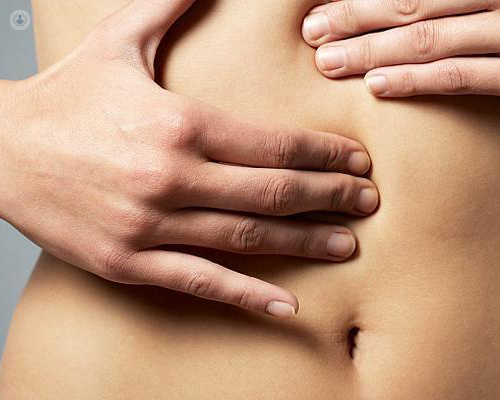What is a hiatus hernia, and how is it related to heartburn?
Written in association with:Leading surgeon Mr Ahmed R. Ahmed answers some of the most frequently asked questions surrounding hiatus hernias, including their symptoms, treatment, and what kind of surgery can be performed as a solution.

What is a hiatus hernia, or hiatal hernia?
A hiatus hernia, sometimes referred to as a hiatal hernia, is a hole or gap that's wider than normal in the muscle called the diaphragm which separates the chest cavity from the abdominal cavity. The diaphragm is a horizontal sheet which normally allows the gullet or the oesophagus to go through a tiny hole, but when you have a hiatus hernia, it means that that hole has become wider than usual, allowing the stomach to pass upwards through that widened hole, so that some of the top part of the stomach is now in the chest cavity rather than being entirely in the abdominal cavity.
What are the symptoms of a hiatus hernia?
Hiatus hernias can give a patient a number of symptoms, typically indigestion and heartburn - the feeling of something burning in the chest area just below the breastbone. Some might even get some discomfort in the upper abdominal area, and some may get some nausea and some bloating, so these are all the kinds of symptoms we can associate with hiatus hernias.
Equally, a lot of people can have a hiatus hernia and not even know about it, so it may display no symptoms at all.
What is the treatment for a hiatal hernia?
The treatment for a hiatus hernia really depends on patients and what kind of symptoms they are having. Typically if the patient is exhibiting classical heartburn type symptoms, this can be treated through dietary modifications - for example, avoiding eating late at night. There are a lot of lifestyle changes that patients can adopt to reduce the symptoms from a hiatus hernia, if advised by a medical professional.
If these don't work then there are a number of effective medications that are available over the counter, in varying strengths. In those patients where tablets and lifestyle changes do not work, then surgical treatment may be considered as an option.
What kinds of surgery can be offered to treat hiatus hernias?
There are essentially two kinds of operations available to fix hiatus hernia. There is a standard anti-reflux operation, classically called the Nissen fundoplication. The alternative operation, which is a newer operation, is called the LINX implant operation, which is a modern, less invasive surgical technique involving a magnetic implant fitted around the oesophagus. This can be used to treat hiatus hernias and the symptoms from hiatus hernia.
Can a hiatus hernia be cured without surgery?
The short answer is no, because a hiatus hernia is a mechanical problem where the hole in the diaphragm is bigger than normal anatomy, and there is no medication that you can use to make the hole any smaller. Hiatal hernias are a mechanical problem and an anatomical anomaly, and therefore they have to be fixed surgically.
The question should be whether the patient who has a hiatus hernia is displaying any symptoms – if have a hiatus hernia and do not have any symptoms, then you don't necessarily need an operation to fix it.
Equally, if you have a hiatus hernia and you have symptoms that you can manage with lifestyle changes, or with medication, then again in that situation you do not need an operation.
Typically we use operations to fix hiatus hernias in those patients where either they don't want to take the medications for the rest of their life, or the medications don't work. In situations like those, having surgery to fix the hiatus hernia and to stop the acid reflux and heartburn is highly effective.
Are there any long-term complications of a hiatus hernia?
If a patient gets acid reflux and heartburn day over a long period of time, and this is not treated, then the acid can actually damage the lining of the oesophagus or the gullet, which can lead to inflammation known as oesophagitis. This can be quite a painful condition. It can cause problems with swallowing, and can cause discomfort in the chest.
There is also a small proportion of patients where the constant acid damage of the lining of the oesophagus can eventually turn into a pre-cancerous condition called Barrett's oesophagus. In the long run this can convert into cancer, so acid reflux and heartburn should really be taken seriously and treated.


